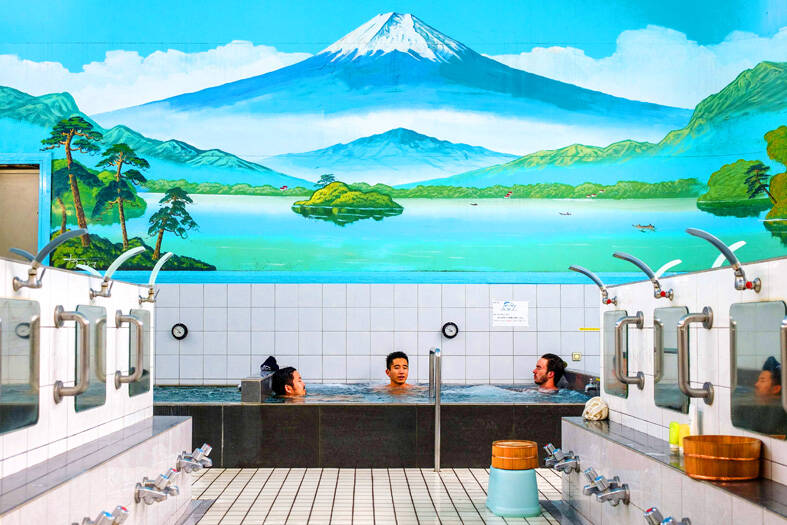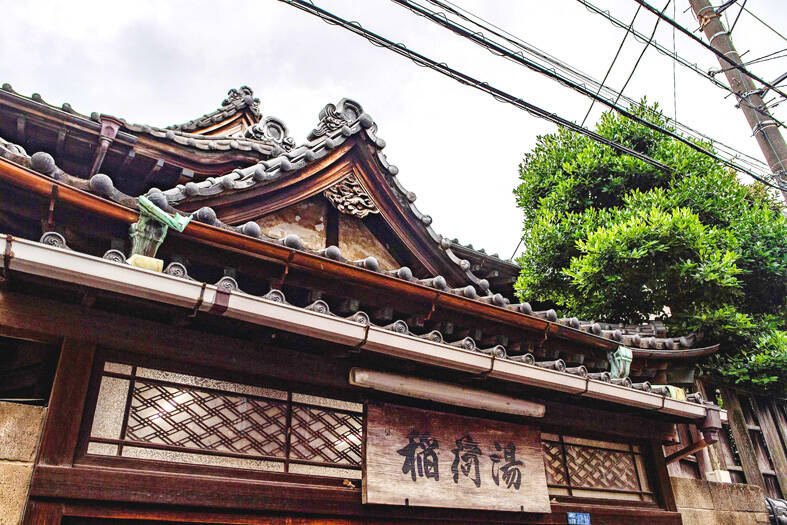Just before it opens each afternoon, elderly residents gather outside one of Tokyo’s last remaining old-style bath houses carrying flannels, soap and shampoo for their regular soak.
With its communal naked tubs, bright mural of Mount Fuji and sliding wooden entrance under a pointed roof, Inariyu is a classic example of a Japanese public bath, or sento.
Once ubiquitous in crowded urban areas, sentos are now closing quickly as more people take baths at home and owners struggle with faltering machinery, high gas prices and a lack of successors, tempting them to sell their valuable land.

Photo: AFP
Nationwide, the number of bath houses has plunged to about 1,800 from a peak of nearly 18,000 in the late 1960s.
However, some such as Inariyu have been given a new lease on life through renovations, while others are reinventing themselves as trendy hangouts or using data analysis to boost business.
One person pushing to save neighborhood baths is Yasuko Okuno, who discovered them as a way to unwind after working late.

Photo: AFP
“Day after day, my mind was tired. Even when I went home, I couldn’t forget about work,” said the 36-year-old writer for the Tokyo Sento Association.
“Then I went to a sento for the first time in a while, and it felt like a weight had lifted. There was a large bath, and the regulars greeted me kindly,” she said.
Over time, “it began to feel like a home from home,” she added.
Japan has never imposed a strict COVID-19 lockdown, and places such as gyms and sentos remained open even when many offices switched to home working and restaurants shortened opening hours.
Masks are commonly worn on trains and in other public places, but there is no requirement to wear them in sentos, although social distancing and quiet bathing are encouraged.
For many elderly people, it is a “daily routine” that they did not want to stop during the pandemic, and some feel safer taking a bath with others around in case they fall, Yasuko said.
Bathhouse closures can erode community ties, said Sam Holden, whose organization Sento & Neighborhood used a grant of about US$200,000 from the World Monuments Fund to renovate Inariyu.
The group strived to keep the cozy, welcoming atmosphere of the bathhouse — built in 1930 in a low-rise area of northern Tokyo where narrow walkways snake between homes.
Inariyu has customers of all ages, including “a lot of elderly people, many of whom might live alone and be prone to isolation,” said Holden, a 32-year-old American who has lived in the capital for nearly a decade.
“My colleagues and I had a sense of urgency in wanting to preserve some of these historic structures before they were redeveloped into apartment complexes and other things,” he said.
Bathers pay ¥500 (US$3.60) to enter the men’s or women’s bath, a fee set by the Tokyo government.
Leaving their shoes in a small locker, they strip off in the changing room and take a shower before climbing into the tubs for a relaxing soak.
Unlike Japan’s hot springs, known as onsen, the water in sentos is usually heated with gas.
Shunji Tsuchimoto, who runs Inariyu with his wife, said that the bathhouse is paying 50 percent more for energy than it did last year.
However, he hopes that holding events in the renovated buildings would raise revenue by drawing younger customers.
“I want them to know this sento culture,” he said.
One sento that has managed to draw a youthful clientele is Koganeyu in eastern Tokyo, which reopened in 2020 after a full makeover.
On a recent Saturday, the bathhouse was packed with young customers drinking craft beer and listening to vinyl records.
Tech worker Kohei Ueda, 25, traveled an hour to use Koganeyu’s sauna with a friend.
“I do have the image of sentos being where grandpas and grandmas gather,” he said.
“But a sento like this that’s more trendy and modern is not like that... I feel more comfortable coming here,” he said.
Kom-pal, another sento, might not have hipster appeal, but 36-year-old owner Fumitaka Kadoya has managed to increase footfall using data-crunching skills he acquired in his previous job as a technician for optical equipment maker Olympus.
Kadoya’s family has run the sento since the 1950s and when he took over three years ago, he set up a database to track information about customers and the timing of their visits.
The data have allowed him to make targeted business decisions, such as hiring female staff to encourage more women to visit and opening on Sunday mornings to ease crowds.
“Sentos have always been a part of Japanese culture,” Kadoya said, and nowadays, leaving everything in a locker while you soak can be a kind of “digital detox.”
“That’s exactly what I think young people need these days,” he said.

Kehinde Sanni spends his days smoothing out dents and repainting scratched bumpers in a modest autobody shop in Lagos. He has never left Nigeria, yet he speaks glowingly of Burkina Faso military leader Ibrahim Traore. “Nigeria needs someone like Ibrahim Traore of Burkina Faso. He is doing well for his country,” Sanni said. His admiration is shaped by a steady stream of viral videos, memes and social media posts — many misleading or outright false — portraying Traore as a fearless reformer who defied Western powers and reclaimed his country’s dignity. The Burkinabe strongman swept into power following a coup in September 2022

‘FRAGMENTING’: British politics have for a long time been dominated by the Labor Party and the Tories, but polls suggest that Reform now poses a significant challenge Hard-right upstarts Reform UK snatched a parliamentary seat from British Prime Minister Keir Starmer’s Labor Party yesterday in local elections that dealt a blow to the UK’s two establishment parties. Reform, led by anti-immigrant firebrand Nigel Farage, won the by-election in Runcorn and Helsby in northwest England by just six votes, as it picked up gains in other localities, including one mayoralty. The group’s strong showing continues momentum it built up at last year’s general election and appears to confirm a trend that the UK is entering an era of multi-party politics. “For the movement, for the party it’s a very, very big

ENTERTAINMENT: Rio officials have a history of organizing massive concerts on Copacabana Beach, with Madonna’s show drawing about 1.6 million fans last year Lady Gaga on Saturday night gave a free concert in front of 2 million fans who poured onto Copacabana Beach in Rio de Janeiro for the biggest show of her career. “Tonight, we’re making history... Thank you for making history with me,” Lady Gaga told a screaming crowd. The Mother Monster, as she is known, started the show at about 10:10pm local time with her 2011 song Bloody Mary. Cries of joy rose from the tightly packed fans who sang and danced shoulder-to-shoulder on the vast stretch of sand. Concert organizers said 2.1 million people attended the show. Lady Gaga

SUPPORT: The Australian prime minister promised to back Kyiv against Russia’s invasion, saying: ‘That’s my government’s position. It was yesterday. It still is’ Left-leaning Australian Prime Minister Anthony Albanese yesterday basked in his landslide election win, promising a “disciplined, orderly” government to confront cost-of-living pain and tariff turmoil. People clapped as the 62-year-old and his fiancee, Jodie Haydon, who visited his old inner Sydney haunt, Cafe Italia, surrounded by a crowd of jostling photographers and journalists. Albanese’s Labor Party is on course to win at least 83 seats in the 150-member parliament, partial results showed. Opposition leader Peter Dutton’s conservative Liberal-National coalition had just 38 seats, and other parties 12. Another 17 seats were still in doubt. “We will be a disciplined, orderly